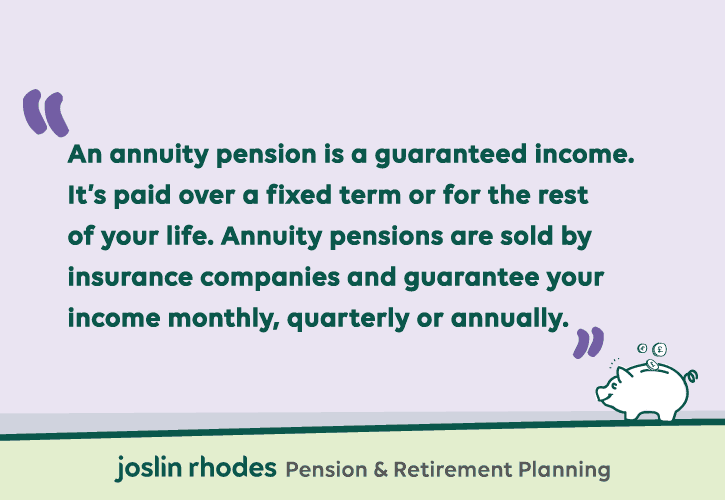What is an annuity pension?
Now more than ever people want to know what their options are. Can you afford to stop working and enjoy your active years. An annuity pension can be a really big part of your retirement fund, so what is an annuity pension?
An annuity pension is a guaranteed income. It’s paid over a fixed term or for the rest of your life. Annuity pensions are sold by insurance companies and guarantee your income monthly, quarterly or annually.
How does an annuity pension work?
You buy an annuity from an insurance provider and they pay you an agreed amount over a specific period of time. As opposed to pension drawdown in which you can access your pension as and when you please.
You’ve got a lot of options open to you when it comes to annuities. It’s really important to understand how these decisions affect you and your income. It’s best to shop around because insurers will offer you different rates based on what they believe the level of risk is. Always consider retirement planning advice from a UK expert advisor before jumping into any decisions.
Types of Annuities
There are a few different types of annuities that you can choose from:
- Fixed-term annuity
- Lifetime annuity
- Purchased life annuity
- Enhance annuities
- Investment-linked annuities
Things like health problems, retirement income, how you feel about risk will all play a part in choosing what’s best for you.
Investment linked annuities
An investment linked annuity guarantees income of a certain level, and the rest is linked to how your investment performs.
You choose your guaranteed level of income and part of your pension pot funds this. Then the rest of your pot is invested and pays extra money based on how well it’s doing. You would get a good income if the markets do well but might only get the minimum guaranteed income amount if the markets perform poorly.
What options do I have when I buy an annuity?
You’ve got lots of options when you’re buying your annuity. They depend on your specific circumstances and they’re there to get you exactly what you want.
Single life annuities
Using your pension pot to buy a single life annuity you receive a guaranteed annuity income for the rest of your life. You can also choose a guaranteed term that will continue to pay a beneficiary if you pass away during that time.
Joint life annuities
Couples usually buy a joint life annuity for a guaranteed annuity income as long as you and your partner are alive. The rate for a joint life annuity is typically lower than a single as the policy is expected to run for a long period of time.
Nominee annuity
You nominate anyone to receive an ongoing annuity after your pass away but it does have to be agreed with the insurer.
They’re different from joint annuities because it’s not the case of the policy carrying on when one person passes away, but a standalone policy with its own terms and conditions. A nominee is an individual other than a dependant.
Successor’s annuity
A successor is an individual who inherits unused drawdown funds.
A successor annuity is a type of annuity that can be bought from the money left, after the death of your initial beneficiary.
Income that remains the same or increases
One of the main choices you need to make is choosing an income that stays the same every year (remains fixed) or one that increases each year.
Fixed/level annuities.
With fixed/level annuities you’ll get the same payments each year for the rest of your life. At first, you get a higher income, but the cost of things rises because of inflation, so you won’t be able to buy as much.
Increasing annuity
Sometimes called an escalating annuity, increasing income helps protect you from rising prices. You usually have two choices, an income that goes up at a fixed rate (3% – 5%) or an income that’s adjusted each year in line with inflation (Retail Price Index linked).
If index linked income, if the market rises your effective buying power would stay that same but if prices fall, then your income would fall as well.
Increasing or level?
If you choose a high annual rate of increase with an increasing retirement income, your starting income will be a lot lower than you would get from a level retirement income.
While a level income might seem tempting because it pays out more to start with, most people live on their retirement income for at least 20 years. And in the last ten years, inflation has caused prices to rise by an average of 3-4% a year.
Guarantee period
A guarantee period ensures that your income carries on paying out for the minimum term, even if you pass away. If you buy a fifteen year guarantee and pass away after ten years, payments will continue for another five years, or you could get a lump sum paid out.
If you don’t have a joint life or nominee annuity set up and you pass away, the income stops after the guarantee period.
Value protection
Value protection provides a lump sum to your beneficiary if you pass away and you haven’t taken out more than you paid for the annuity. Say if you paid £100,000 into your annuity and only received £70,000 by the time you died, £30,000 would be paid out to your beneficiary.
How is an annuity paid?
Your annuity is either paid at the start of the payment period or in arrears at the end. You can usually choose monthly, quarterly, half-yearly or annual payments. You do pay income tax but the insurer will usually deduct tax and pay you the net income.
Payments are made with or without ‘proportion.’ When you die, if you choose “with proportion,” a percentage of your next income payment is paid. It’s based on how many days have passed since your last payment and the date of your death.
If you choose a guarantee period and a continuing income to a dependant, and then you die, your dependant will get both payments if you choose ‘with overlap.’
If you choose “without overlap,” then the dependent’s income will not start until the end of the guarantee term.
Where can I buy an annuity?
Arranging an annuity can be a complicated process. It’s well worth shopping around and getting independent financial advice because you can only buy an annuity once, and you can’t change your mind once you’ve bought.
Independent financial Advisers research the annuity market for you and make a recommendation based on your goals. It might seem cheaper to go down the non advised route but in 2020 ‘Which? Financial Services’ reported the people lost £1bn in pension income by not shopping around.
How much money will I get from an annuity?
The amount of money you get from an annuity will depend on a few things. The main ones being:
• Your age
• Your health
• How much you pay for it
• The provider’s rates
Your annuity rates will also differ depending on where you live and what guarantees and coverage you want.
It’s tough to know how much you’ll make each year without consulting an independent financial expert. Your advisor can examine all of your circumstances and search the market as a whole to select the best offer for you, as well as check whether you qualify for an enhanced annuity or guaranteed annuity rates.
How much does a £100K annuity pay per month?
If you were to retire at 61 with a £100,000 single and fixed annuity at 5%, you could take your tax-free payment of £25,000 and get a monthly income of around £216.
These figures are only estimates and your personal circumstances can really change what these figures are. It’s worth getting in touch with an independent financial advisor to find out what’s best for you.
How much does a £200k annuity pay per month?
If you were to retire at 61 with a £200,000 joint and fixed annuity at 5%, you could take a tax free payment of £50,000 and get a monthly income of around £933.
These figures are only estimates and your personal circumstances can really change what these figures are. It’s worth getting in touch with an independent financial advisor to find out what’s best for you.
How much does a £300K annuity pay per month?
If you were to retire at 65 with a £300,000 joint and fixed annuity at 5%, you could take a tax free payment of £75,000 and get a monthly income of around £991 for the rest of your life.
These figures are only estimates and your personal circumstances can really change what these figures are. It’s worth getting in touch with an independent financial advisor to find out what’s best for you.
Can you cash in an annuity pension?
When you buy an annuity, the provider will tell you that you have a 30-day cooling-off period. You can change your mind at this time and tell the annuity provider, usually in writing, that you don’t want to go ahead.
That’s not the same as cashing in your annuity. If you’ve passed your cooling off period it’s highly unlikely that you’ll be able to cash in.
Why are annuities so inflexible?
The reason annuities are so inflexible is that they’re designed to provide you with a guaranteed retirement income. The trade-off for that guarantee is that the pension provider can use your pension fund for their investment purposes. Regardless of how the pension provider does, they have to pay you what’s been agreed, either for the rest of your life or the agreed fixed term. The alternative to a pension annuity is a pension drawdown.
Is a pension annuity worth it?
There are a lot of upsides to annuities. The guaranteed income for life offer you security and peace of mind. However, your income might not be as much as you’d like, and you won’t have the option of changing it if you suddenly find you need more money. It’s always worth speaking to an independent financial advisor to help you with your options.

Fixed-term annuity
You get a guaranteed income for the agreed term which is usually five to ten years. At the end of the term you’ll usually get a lump sum (‘maturity amount’). The lump sum is any money you’ve paid in, how much it’s grown, minus the money you’ve received.
This means you’re not tied into one provider for the rest of your life and gives you the flexibility to get a better rate based on your changing circumstances.
Lifetime annuity
A lifetime annuity is usually bought with money from your pension pot and will pay you a guaranteed income for life. That’s peace of mind that you won’t run out of money regardless of how long you live and, you can buy an annuity that increases each year so you’re protected from things like inflation.
When you buy a lifetime annuity, the decision is irreversible and you might get less than you paid for your annuity depending on how long you live. You can provide an income or lump sum for a dependent when you pass away.
Purchased life annuity
You can buy a purchased life annuity with money that’s not in your pension pot. Some people choose to buy one with their 25% tax-free lump sum.
It works the same way as other annuities but is treated differently when it comes to tax. You don’t pay tax on the money you put in (the capital) but you do pay income tax on the interest it makes.
Enhanced annuity
Enhanced annuity is also known as an ‘impaired life’ annuity. Enhanced annuities offer higher guaranteed income based on health problems or if you’ve been diagnosed with an illness. Certain insurers will also offer you higher rates depending on what you’ve done for work or where you live in the country.
You will get questions about your health and the insurer will likely ask your doctor for more information. They’ll probably want you to attend a medical examination because the rate you offer is based on your life expectancy.
Some of the health problems that mean you could get a higher guaranteed income include:
- Stroke
- Cancer
- Diabetes
- Heart attack
- Kidney failure
- Chronic asthma
- Multiple sclerosis
- High blood pressure
- High cholesterol
"I cannot find fault with the service we received. From the warm yet professional welcome to the financial advice we were given. You as a company should be proud of the service you are providing" Mr. WTalk To The Experts
Ready to talk? Our friendly team are here to help. Simply pop a few details into the form and we'll be in touch.
We'll show you:
When you can afford to retire
How much money you'll need in retirement
How to make the most of your pensions and other assets to fund your lifestyle
4.9 out of 5 stars on VouchedFor



